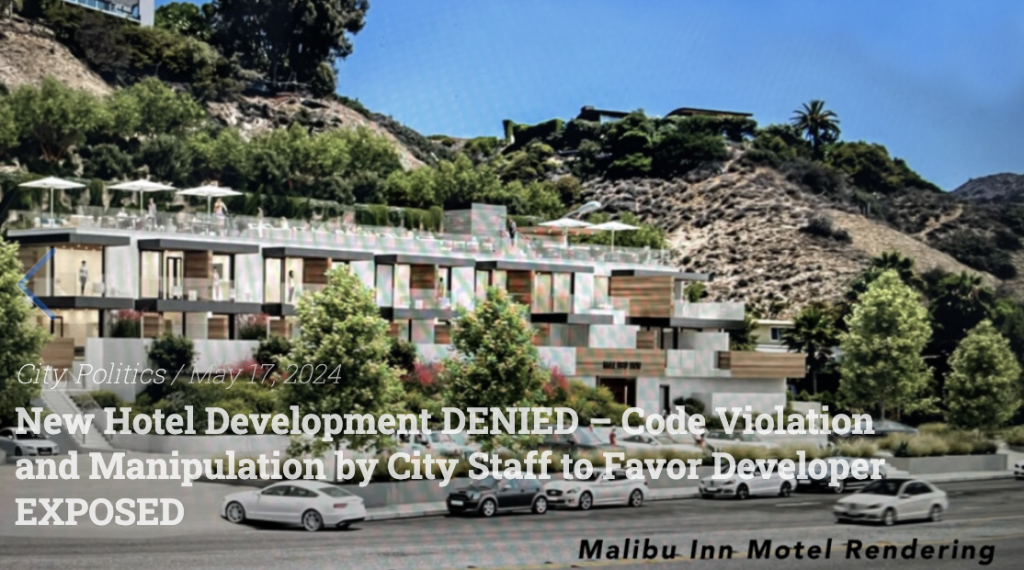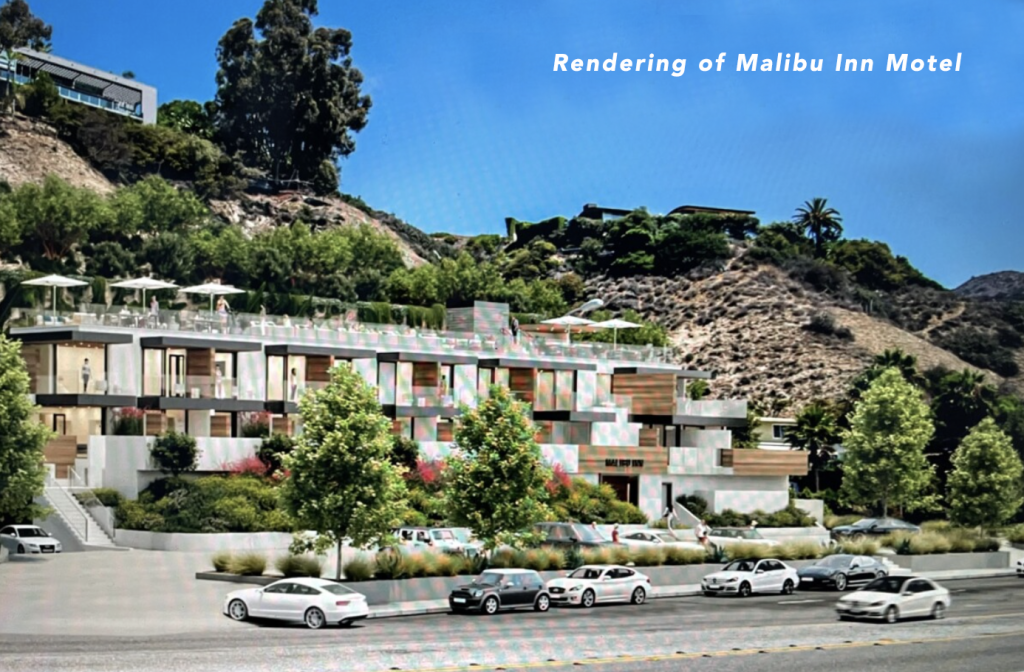
Malibu city officials council member Paul Grisanti, Malibu planning staff Assistant Planning Director Adrian Fernandez and Planning Director Richard Mollica stand accused of attempting to manipulate city codes to favor Surfrider Plaza, LLC, a commercial developer.
This alleged maneuvering starkly contrasts with Malibu’s Mission Statement to protect the environment and uphold community values.
The controversy centers on an appeal regarding a proposed 20-room motel at 22959 Pacific Coast Highway, overseen by Surfrider Plaza, LLC. Despite the Malibu Township Council’s objections, the Planning Commission approved several variances for the project, including construction on steep slopes and parking in the front yard setback. The appeal, however, was ultimately denied, sparking outrage among environmental advocates and residents.
ALLEGATIONS OF CODE MANIPULATION
The report prepared by Fernandez and reviewed by Mollica, outlines the project’s compliance with city codes and the California Environmental Quality Act (CEQA). However, critics argue that the project blatantly violates multiple zoning laws, coastal bluff provisions, and grading requirements.
Opponents, including the Malibu Township Council, argue that the project’s extensive grading, which involves excavating a substantial portion of a coastal bluff, and the proposed building height, which exceeds standard restrictions, are clear violations. The retaining wall, projected to reach 52.5 feet in height, far exceeds the permissible limit, raising concerns about environmental impact and setting a dangerous precedent for future developments.
MALIBU’S MISSION STATEMENT
Malibu’s mission statement emphasizes preserving its natural beauty and ensuring sustainable development. This project, with its potential to disrupt coastal bluffs and the community’s character, has been criticized as a betrayal of these principles. The appeal’s rejection has intensified scrutiny on the city’s commitment to environmental stewardship.
COUNCIL DYNAMICS AND CONFLICTS OF INTEREST
The effort to push the project forward saw divided opinions within the Malibu City Council. Paul Grisanti, the sole council member in support, is notably a real estate agent, raising questions about conflicts of interest. His stance further fueled suspicions about the influence of commercial interests over public welfare and environmental protection.
Last fall, a formal complaint was filed with the FPPC naming Grisanti and council member Marianne Riggins, and their appointments to the Planning Commission who have previously refused to recuse themselves from voting on building projects they, and potentially the council members who appointed them, can financially benefit from. Which is essentially the motivation for council member and realtor Grisanti to appoint commissioners who will pass these controversial projects.
In 2009, Grisanti was the spokesperson for the La Paz project, pushing the largest commercial mall in Malibu with over 130,000 sq. ft. Recently completed, the La Paz center continues to sit vacant, a veritable retail ghost town in the Civic Center area.
BLATANT VIOLATION OF BUILDING CODES AND INADEQUATE ENVIRONMENTAL IMPACT ASSESSMENT
The proposed development includes a 7,693 square foot, two-story motel with a subterranean garage, surface parking lot, rooftop bar, and various other amenities. The project’s location at 22959 Pacific Coast Highway falls within the Commercial Visitor Serving-1 (CV-1) zoning district, a designation intended to support visitor-serving commercial activities while preserving the natural environment.
Critics highlight numerous specific violations in the project plan. The project’s grading would involve the excavation of 12,648 cubic yards of soil, with 11,860 cubic yards of it to be exported. Opponents argue this scale of grading, is not only excessive, but also contrary to the city’s standards for non-exempt grading amounts.
Additionally, the proposed retaining wall, required to secure the graded slope, would reach an unprecedented height, raising concerns about long-term environmental stability and visual impacts on the coastal landscape.
The Planning Commission’s approval of these variances, including exceptions for construction on slopes steeper than 3 to 1 and parking within the required front yard setback, has been a focal point of the dispute. The Malibu Township Council’s appeal listed 20 specific grounds for opposition, ranging from violations of zoning and building height restrictions to inadequate environmental impact assessments and failure to address low-cost accommodation requirements.
Jo Drummond, President of the Malibu Township Council outlined the multiple code violations in an extensive, detailed slide presentation urging city council to vote against the project.
“As you know, Malibu Township Council has been advocating for responsible development since 1947. There is an abundance of code violations, a lack of findings for the variances applied, and excessive grading. Over 24 million pounds to be exact, over 12,000 cubic yards out of coastal bluff,” said Drummond.
COMMUNITY RESPONSE AND FUTURE IMPLICATIONS
The decision has sparked a heated debate among Malibu residents and environmental groups, who view the project as a threat to the city’s ecological and cultural integrity. The Malibu Township Council’s detailed appeal listed numerous violations and demanded stricter adherence to the city’s regulations.
“The City of Malibu must be held accountable and explain how this disastrously flawed development passed through this Planning Department with no checks and balances. Subsequently, how it was approved by compromised building contractors on the planning commission. None of whom were required to recuse themselves. Malibu residents must demand answers, as well as the developer, who appears to have been seriously misled. Every concern expressed by residents for over 3 years has been proven accurate by this council. Malibu’s City Hall is dangerously broken.” said Malibu environmentalist Jae Flora-Katz.
Residents and environmental groups have organized protests and petition drives, emphasizing that the proposed project is out of sync with Malibu’s longstanding commitment to environmental preservation and sustainable development. The community’s resolve to protect its unique coastal environment remains steadfast, and the controversy surrounding the Surfrider Plaza project has galvanized local activism.
This case serves as a pivotal moment for Malibu, highlighting the need for transparent governance and unwavering commitment to its foundational values. The outcome not only affects this specific project but also sets a precedent for how future developments will be approached in the coastal city.
Local environmentalist and former White House official Trevor Neilson made this observation about council member Paul Grisanti’s vote on Monday: “Whether Grisanti realizes it now, or will realize it later, that vote was the end of his political career”.
The accusations against Adrian Fernandez and Richard Mollica for allegedly manipulating city codes to benefit Surfrider Plaza, LLC, cast a long shadow over Malibu’s governance. The community’s resolve to protect its environment and uphold its mission statement remains strong, as residents and advocates continue to demand accountability and sustainable development practices. The case underscores the critical importance of adhering to established environmental protections and maintaining the integrity of Malibu’s planning processes to ensure that the city’s natural beauty and community values are preserved for future generations.






Leave a Reply